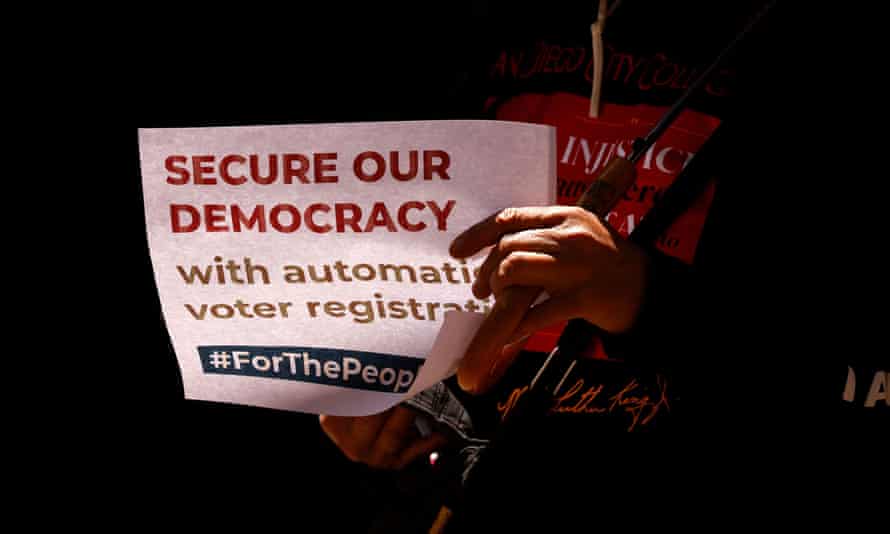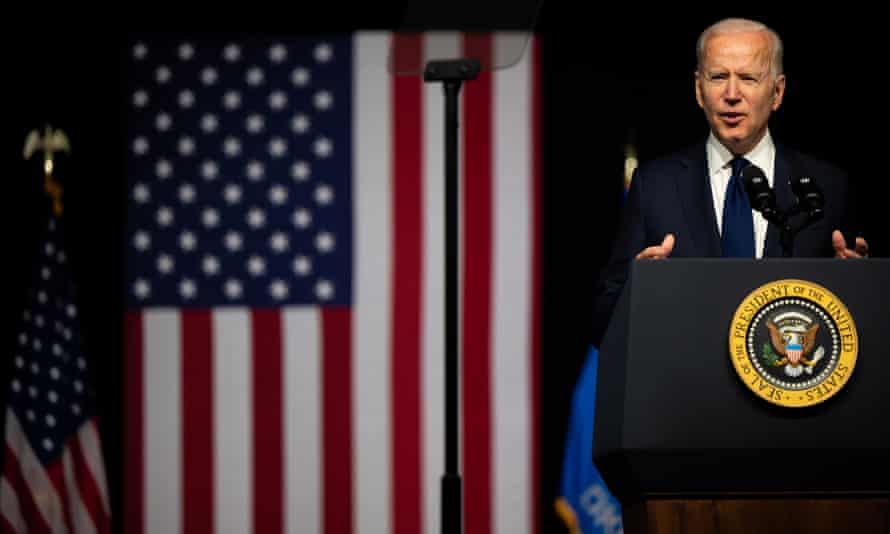If Donald Trump’s inaugural address can be summed up in two words – “American carnage” – Joe Biden’s might be remembered for three: “Democracy has prevailed.”
The new president, speaking from the spot where just two weeks earlier a pro-Trump mob had stormed the US Capitol, promised that the worst was over in a battered, bruised yet resilient Washington.
But now, four and a half months later the alarm bells are sounding on American democracy again. Even as the coronavirus retreats, the pandemic of Trump’s “big lie” about a stolen election spreads, manifest in Republicans’ blocking of a commission to investigate the insurrection. And state after state is imposing new voting restrictions and Trump allies are now vying to run future election themselves.
With Republicans still in thrall to Trump and odds-on to win control of the House of Representatives next year, there are growing fears that his presidency was less a historical blip than a harbinger of systemic decline.
“There was a momentary sigh of relief but the level of anxiety is actually strangely higher now than in 2016 in the sense that it’s not just about one person but there are broader structural issues,” said Daniel Ziblatt, co-author of How Democracies Die. “The weird emails that I get are more ominous now than they were in 2016: there seems to be a much deeper level of misinformation and conspiracy theories.”
Just hours after the terror of 6 January, 147 Republicans in Congress voted to overturn the results of the 2020 presidential election despite no evidence of irregularities. Trump was impeached for inciting the violence but Senate Republicans ensured his acquittal – a fork in the road where the party could have chosen another destiny.
As Trump continued to push his false claims of election fraud, rightwing media and Republican state parties fell into line. A farcical “audit” of votes is under way in Arizona with more states threatening to follow suit. Trump is reportedly so fixated on the audits that he has even suggested – wrongly – he could be reinstated as president later this year.
Perhaps more insidiously, Trump supporters who tried to overturn the 2020 election are maneuvering to serve as election officials in swing states such as Arizona, Georgia, Michigan and Nevada. If they succeed in becoming secretaries of state, they would exercise huge influence over the conduct of future elections and certifying their results. Some moderate Republican secretaries of state were crucial bulwarks against Trump’s toxic conspiracy theories last year.
The offensive is coupled with a dramatic and sweeping assault on voting rights. Republican-controlled state legislatures have rammed through bills that make it harder to vote in states such as Arizona, Florida, Georgia, Iowa and Montana. Their all-out effort in Texas was temporarily derailed when Democrats walked out of the chamber, denying them a quorum.

Ziblatt, a political scientist at Harvard University, commented: “The most worrying threat is at the state level, the effort to change voting rules, which I think is prompted by the failed effort to alter the election outcome of 2020.
“The lesson Republicans have learnt from that is they don’t really suffer any electoral consequences from their base pursuing this kind of thing. In fact, they’re rewarded for it. That’s very ominous because that suggests they’ll continue to try to do this until they pay an electoral price for it, and so far they don’t sense they’re paying an electoral price for it.”
Where is this authoritarian ecosystem heading? For many, the nightmare scenario is that Trump will run again in 2024 and, with the benefit of voter suppression, sneak a win in the electoral college as he did in 2016. If that fails, plan B would be for a Republican-controlled House to refuse to certify a Democratic winner and overturn the result in Trump’s favour.
Disputed presidential elections have been thrown to the House before, Ziblatt noted. “It’s not unprecedented but in those earlier periods you had two parties that were constitutional, fully democratic parties. The thought of having a dispute like that when one of the parties is only questionably committed to democratic rules and norms is very frightening.”
People use elections to get into power and then, once in power, assault democratic institutions
“That’s Viktor Orbán [in Hungary], that’s Recep Tayyip Erdoğan [in Turkey], that’s Hugo Chávez [in Venezuela] and what’s distinctive about that is that it often begins incrementally. So people continue to go about their lives, continue to vote, parliament continues to meet and so you think, ‘Is there really a threat?’ But the power concentrates so it becomes harder and harder to unseat an incumbent.”
He added: “We shouldn’t overlook that fact that we had a change in government in January. What that suggests is our electoral institutions do work better than they do in Hungary. The opposition in the United States is more well-organised and financed than the Hungarian opposition or the Turkish opposition, so we shouldn’t overstate that. But on the other hand, the tendencies are very similar.”
Republicans are also playing a very long game, rewiring democracy’s hard drive in an attempt to consolidate power. Trump is arguably both cause and effect of the lurch right, which takes place in the wider context of white Christians losing majority status in America’s changing demographics.
His grip on the party appears only to have tightened since his defeat, as evidenced by the ousting of Trump critic Liz Cheney from House leadership and their use of a procedural move known as the filibuster to block the 6 January commission. Critics say that, in an atmosphere of partisan tribalism, the party is now driven by a conviction that Democratic victories are by definition illegitimate.
Kurt Bardella, a former Republican congressional aide who is now a Democrat, said: “It’s very clear that the next time there is a violent effort to overthrow our government, Republicans in Congress will be knowing accomplices in that effort. They are the getaway driver for the democratic arsonists.”
Bardella, a political commentator, added: “It has become painfully transparent that the Republican party platform is 100% anti-democratic and it is their ambition to impose minority rule on the majority going forward, because they know that when the playing field is level, they can’t win and so they have instead decided to double down on supporting a wannabe autocrat, and are doing everything they can to destabilise the democratic safeguards that we’ve had in place since the founding of our country.
“We cannot underestimate the gravity of this moment in time because what happens over the next month or year could be the turning point in this battle to preserve our democracy.”
The threat poses a dilemma for Biden, who was elected on a promise of building bridges and seeking bipartisanship. He continues to do so while issuing increasingly stark calls to arms. Speaking in Tulsa, Oklahoma, this week, he repeated his “democracy prevailed” mantra but then warned of a “truly unprecedented assault on our democracy” and announced that the vice-president, Kamala Harris, would lead an effort to strengthen voting rights.

Proposed national legislation to address the issue, however, depends on a Senate currently split 50-50 between Democrats and Republicans (Harris has the tie-breaking vote). In order to pass it with a simple majority, Democrats would first have to abolish the filibuster but at least two senators, Joe Manchin of West Virginia and Kyrsten Sinema of Arizona, have ruled out such a step.
Facing this stalemate, activists and civil society are trying to create a sense of urgency. More than a hundred scholars this week released a joint statement, posted by the New America thinktank, expressing “deep concern” at “radical changes to core electoral procedures” that jeopardise free and fair elections. “Our entire democracy is now at risk,” the scholars wrote.
Last year’s poll was dubbed “the election that could break America” and the nation was widely considered to have dodged a bullet; it may not be so fortunate in 2024. Yvette Simpson, chief executive of the progressive group Democracy for Action, added: “We’re getting to the place where we might not be able to call ourselves a democracy any more. That’s how dire it is.
“It is not just the fact that there is an orchestrated, concerted effort across our country to interfere with the most fundamental right of any democracy but that they’re doing it so blatantly, so out in the open and so unapologetically, and that there have been many attempts and there’s no easy way to stop it.”
Simpson compared Democrats’ victory over Trump to the film Avengers: Endgame and warned against complacency. “We just defeated Thanos and everybody was like, ‘OK, let’s take a break,’ and I’m like, ‘No, we cannot take a break because the GOP never take a break’. They know that we’re taking a break and that’s why they’re doing it now and so aggressively: ‘You think you won because Trump is out? Oh, we got you.’”
Ibram X Kendi, a historian and author of How to Be an Antiracist, added: “At the end of the day, there is an all out war on American voters, particularly younger voters, particularly younger voters of colour, and it’s happening from Texas to Florida and it’s really causing the American people to decide whether we want our democracy or not.”
By: David Smith
Source: Guardian



